Related Research Articles
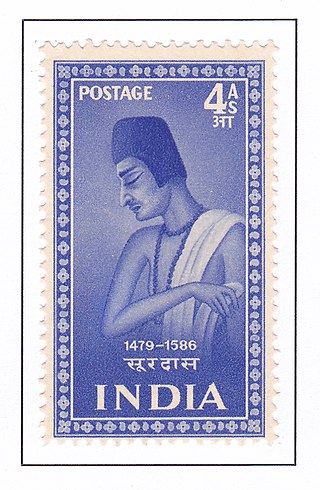
Surdas was a 16th-century blind Hindu devotional poet and singer, who was known for his works written in praise of the deity Krishna. He was a Vaishnava devotee of Krishna, and he was also a revered poet and singer. His compositions glorified and captured his devotion towards Krishna. Most of his poems were written in the Braj language, while some were also written in other dialects of medieval Hindi, like Awadhi.

Nissim Ezekiel was an Indian Jewish poet, actor, playwright, editor and art critic. He was a foundational figure in postcolonial India's literary history, specifically for Indian poetry in English.
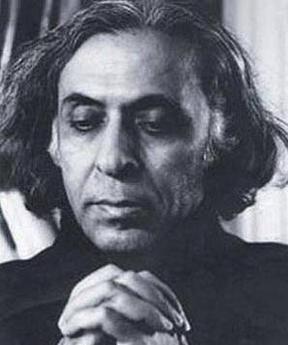
Raja Rao was an Indian-American writer of English-language novels and short stories, whose works are deeply rooted in metaphysics. The Serpent and the Rope (1960), a semi-autobiographical novel recounting a search for spiritual truth in Europe and India, established him as one of the finest Indian prose stylists and won him the Sahitya Akademi Award in 1963. For the entire body of his work, Rao was awarded the Neustadt International Prize for Literature in 1988. Rao's wide-ranging body of work, spanning a number of genres, is seen as a varied and significant contribution to Indian English literature, as well as World literature as a whole.

The Sahitya Akademi, India's National Academy of Letters, is an organisation dedicated to the promotion of literature in the languages of India. Founded on 12 March 1954, it is supported by, though independent of the Indian government. Its office is located in Rabindra Bhavan near Mandi House in Delhi.

Telugu literature is the body of works written in the Telugu language. It consists of poems, short stories, novels, plays, and song lyrics, among others. There is some indication that Telugu literature dates at least to the middle of the first millennium, the first extant works are from the 11th century when the Mahabharata was first translated to Telugu from Sanskrit by Nannaya. The language has experienced a golden age under the patronage of the Vijayanagara Emperor-Poet Krishnadevaraya.
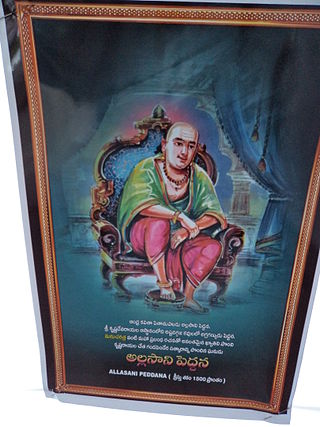
Mahakavi Allasani Peddana was a prominent Telugu poet and the foremost Ashtadiggaja in the imperial court of Emperor Krishnadevaraya of Vijayanagara.

Ashtadiggajas is the collective title given to the eight great Telugu scholars and poets in the court of Emperor Krishnadevaraya, who ruled the Vijayanagara Empire from 1509 until his death in 1529. During his reign, Telugu literature and culture reached its zenith. In his imperial court, these eight poets were regarded as the eight pillars of his literary assembly. The age of Ashtadiggajas is called the Prabandha Age. Each Ashtadiggaja had composed at least one Prabandha Kavyamu, and it was the Ashtadiggajas who gave Prabandha its present form. Most Ashtadiggajas were from Rayalaseema. The Ashtadiggajas Allasani Peddana, Dhurjati, Nandi Thimmana, Madayyagari Mallana and Ayyalaraju Ramabhadrudu were from Rayalaseema. Pandit Ramakrishna hailed from Tenali in the Guntur district of Andhra Pradesh. Ramarajabhushanudu and Pingali Surana were the other two Ashtadiggajas.
Indian English literature (IEL), also referred to as Indian Writing in English (IWE), is the body of work by writers in India who write in the English language but whose native or co-native language could be one of the numerous languages of India. Its early history began with the works of Henry Louis Vivian Derozio and Michael Madhusudan Dutt followed by Rabindranath Tagore and Sri Aurobindo. R. K. Narayan, Mulk Raj Anand and Raja Rao contributed to the growth and popularity of Indian English fiction in the 1930s. It is also associated, in some cases, with the works of members of the Indian diaspora who subsequently compose works in English.
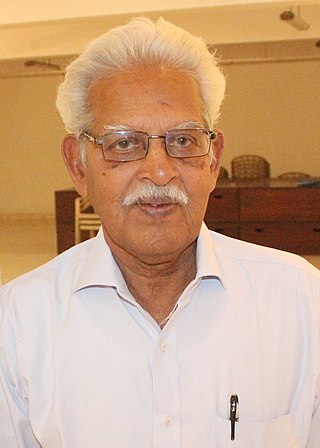
Pendyala Varavara Rao is an Indian activist, poet, teacher, and writer from Telangana, India. He is an accused in the 2018 Bhima Koregaon violence and has been arrested under the non-bailable Unlawful Activities (Prevention) Act. Rao was arrested on the charge of plotting to assassinate Indian prime minister, possibly based upon planted evidence. In August 2022, he was released on bail by the Supreme Court of India, on medical grounds.

The Sahitya Akademi Award is a literary honour in India, which the Sahitya Akademi, India's National Academy of Letters, annually confers on writers of the most outstanding books of literary merit published in any of the 22 languages of the 8th Schedule to the Indian constitution as well as in English and Rajasthani language.
Indian English poetry is the oldest form of Indian English literature. Henry Louis Vivian Derozio is considered the first poet in the lineage of Indian English poetry followed by Rabindranath Tagore, Sri Aurobindo, Sarojini Naidu, Michael Madhusudan Dutt, and Toru Dutt, among others.
Rudrabhatta was an influential 12th-century Kannada poet in the court of the Hoysala Empire King Veera Ballala II(r.1173–1220 CE). According to Kannada language expert Narasimhacharya, the poet was also patronized by a minister of the King. The literary critic Mukherjee feels that after a century of literary revolution caused by the Veerashaiva poets, a benevolent atmosphere created by the king may have encouraged this Vaishnava writer and poet.
The Sahitya Akademi Fellowship is a literary honour in India bestowed by the Sahitya Akademi, India's National Academy of Letters. It is the highest honour conferred by the Akademi on a living writer, the number of fellows at no time exceeding 21. Elected from among writers thought by the Akademi to be of acknowledged merit, the fellows are sometimes described as the "immortals of Indian literature."
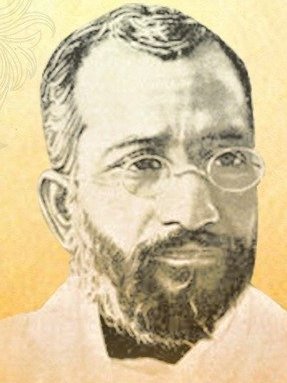
Madhusudan Rao was an Odia poet and writer from India. He was known as Bhaktakabi. His most well known work is the Chhabila Madhu Barnabodha.
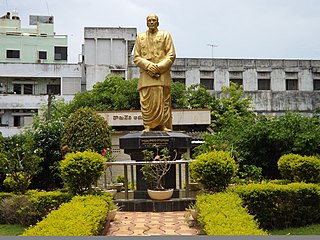
The Andhra Pradesh Library Association was established on 10 April 1914. It is the oldest state library association in India. The association is headquartered at Vijayawada. The association emerged with a noble mission of spreading literacy, knowledge, and awareness among the public. Since its inception, the association has been functioning with the sole aim of taking library movement to the public.

Garikipati Narasimha Rao is an Indian scholar, litterateur, and avadhani from Andhra Pradesh. In 1996, he performed Avadhanam with 1116 Pruchchakas for 21 days in Kakinada. He also delivers lectures on personality development based on dharmic culture and way of life. He regularly appears on Telugu TV channels like SVBC, Bhakti TV, and ABN Andhra Jyothi giving discourses on ancient Hindu texts like Bhagavadgita, Ramayana, and Mahabharata. In 2022, he was awarded India's fourth-highest civilian award Padma Shri by the government of India.
The Raja Rao Award, in some sources the Raja Rao Award for Literature, is a former literary award named in honour of expatriate Indian writer Raja Rao, and bestowed "to recognize writers and scholars who have made an outstanding contribution to the Literature and Culture of the South Asian Diaspora." It has been described as "prestigious", and "an important Indian literary prize". It was bestowed by a jury upon seven recipients between its establishment in 2000 and its cessation in 2009. The award was given annually from 2000 to 2004, after which it was given biennially, with one award being given for 2005-2006, and one being given for 2007-2008.

Sribhashyam Vijayasarathi was an Indian author, Sanskrit grammarian, philosopher and critic.

Asavadi Prakasa Rao was an Indian poet, critic, translator and scholar, who is known for his poetry and prose works. He is noted for his significant contribution to Telugu and Sanskrit literature. In January 2021, he was awarded India's fourth-highest civilian award the Padma Shri in the Arts and Literature category. As Ashtavadhani, he has given 170 performances and has written and published 50 books across various genres. His most notable literary contribution is his performance of Avadhanam – a literary performance. He has received an honorary D Litt from Potti Sreeramulu Telugu University and a Distinguished Teacher award from the Department of Higher Education, Government of Andhra Pradesh.
Velcheru Narayana Rao is an Indian author, critic, and literary translator. He is a professor at the University of Wisconsin–Madison in the Department of South Asian Studies. His work is primarily focused on Telugu literature for which he received the Sahitya Akademi Fellowship, the highest honour conferred by Sahitya Akademi, in February 2021.